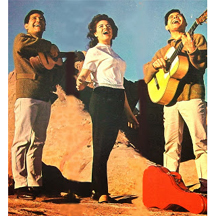After the Ortiz family settled in Albuquerque, New Mexico, their first musical foray was as the Ortiz Trio, evidently consisting of siblings Ruben Ortiz, Anita Ortiz and Steven Ortiz. Ruben described the music as “Ranchero style and Bolero style”.
After they moved East, the band’s name was changed to the Coronados; Ruben changed his name slightly to Reuben Ortiz, and Steven Ortiz masqueraded as a brother-in-law, rather than a brother, by the name of Steven Coronado. Sources vary, with some saying that Anita Ortiz continued in the Coronados; but at least by 1965, Reuben’s wife Ginger Ortiz was on board. The Coronados recorded numerous 45’s and one album, called Hey, Love!; their music was released on Jubilee Records and RCA Victor Records.
* * *
This photograph of the Coronados with Jack Spector, a prominent New York City disc jockey on WMCA, was published in Billboard Magazine in 1965. (Spector is notable for having been the first DJ in New York to play the Beatles’ initial Capitol Records single, “I Want to Hold Your Hand” in late December 1963). Their music is described in the Daily Herald article mentioned previously in this way: “The mode became eclectic – show tunes, popular numbers – with a professional gloss appropriate to the Borscht Belt and other resort circuits.”
Meanwhile, the four teenaged children of the bandmembers in the Coronados – who sometimes appeared with their parents on stage – were being attracted to rock music and began singing and performing together as the Real Americans.
As an experiment, Reuben Ortiz decided to see how the Coronados and the Real Americans would sound if their music were combined. Ginger Ortiz recalled: “There was a kind of realism to this music. It was a nice contrast to what we’re always supplying as the Coronados: those dreams that our audiences want.”
The result of this merger of the two bands is Silverbird. Their career was launched on May 2, 1971 on one of the Fanfare programs on National Educational Television (NET), a precursor to Public Broadcasting Service (PBS).
(August 2013)















